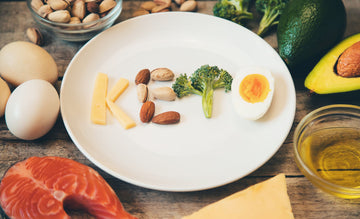The keto diet is based on a high fat intake, a moderate amount of protein and a greatly reduced carbohydrate intake. The ratio between these macronutrients plays a crucial role in getting the body into a state of ketosis and keeping it there. But how much protein is actually allowed on the keto diet and what should you pay attention to?
The Importance of Protein in the Keto Diet
Protein is an essential building block for the body. It is needed for tissue regeneration, muscle building and numerous metabolic processes. However, in the keto diet, it is not used as the main source of energy, as this could disrupt ketosis. A moderate amount of protein is enough to meet needs without affecting blood sugar levels by converting excess protein into glucose (gluconeogenesis).
Guidelines for protein intake
The recommended protein intake in the keto diet is often around 1 to 1.5 grams of protein per kilogram of body weight per day. This amount can vary depending on activity level and individual goals. Athletes or very active individuals often need more protein, while people with a sedentary lifestyle tend to need less. It is important that the protein fits into the overall context of the macronutrient distribution and that fat makes up the largest part of the diet.
Which proteins should you avoid on the keto diet?
Not all protein sources are ideal for the keto diet. Processed meat products such as sausages or ham often contain sugar or starch, which unnecessarily increase the carbohydrate content. Many protein bars and shakes can also contain hidden sugar or unwanted additives that impair ketosis. Lean protein sources such as chicken breast provide protein but little fat, which can shift the ratio in the keto diet. Plant-based protein sources such as lentils or chickpeas are also unsuitable because they often have a high carbohydrate content. For a successful keto diet, unprocessed, natural protein sources that contain few or no carbohydrates should be preferred, while processed and carbohydrate-rich alternatives should be avoided if possible.
How to choose the right protein sources?
When choosing protein sources for the keto diet, you should pay attention to quality and composition. Fatty meats such as beef, pork or lamb are ideal because they provide the desired ratio of protein to fat. Fatty fish such as salmon or mackerel are also excellent. Eggs, which contain both protein and fat, are also a perfect addition to the keto diet. For variety, cheese, cottage cheese or special keto-friendly protein powders can be used.
The right amount of protein is crucial for the success of the keto diet. While it is essential to meet your daily protein needs, you should make sure to keep your intake moderate so as not to endanger ketosis. A conscious selection of high-quality protein sources not only supports your nutritional goals, but also ensures a varied and balanced keto diet.
This article is for informational purposes only and is not a substitute for individual advice from a doctor or nutritionist.





